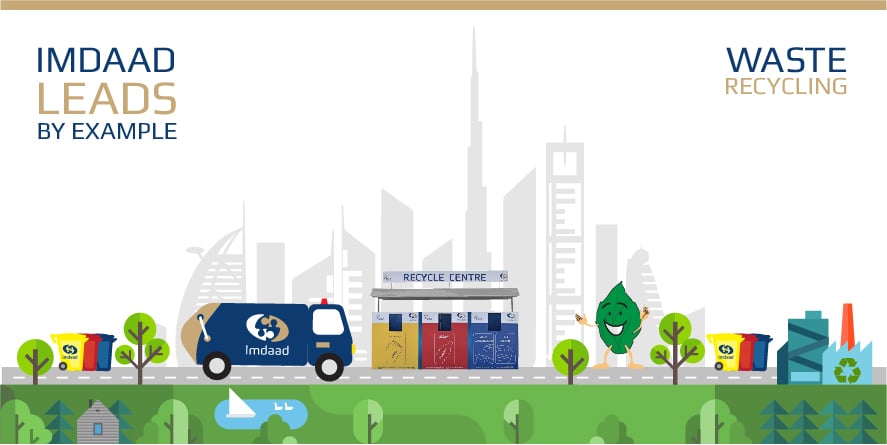
Waste Management is a hot topic both within the UAE and globally. The UAE has seen a dramatic increase in investment within the sector, prompted by global forces but also by policy making. This study looks at how the country is driving change in this area and the opportunities that might create.
Local Changes
At the core of this surge is UAE’s Vision 2021 and goal of recycling or reusing 75% of municipal solid waste. Currently, 77% of such waste is dumped in landfills and the government have introduced draft legislation to help the country achieve its ambitious and worthy objective.
It is important to note that increased recycling will probably only account for the reuse of 30% of solid waste. Other contributing factors are likely to include capturing energy from incinerated waste and the introduction of compost plants. There is also a willingness to push for a reduction in the use of non-recyclable items through awareness programs.
The legislation introduced to facilitate hitting the Vision 2021 target emphasises this reduction in non-recyclable items by enabling the Ministry of Climate Change and Environment to prohibit or limit the use of single use plastics.
The Regional Context
The GCC, and indeed the Middle East, is now at a crossroads, where government policies and investment in the environmental sector are being introduced simultaneously across the GCC.
For example, Saudi’s Public Investment Fund (PIF) have declared their intention to establish a national recycling company that will be tasked with increasing the Kingdom’s recycling rates from 10% to 85% by 2030, whilst Bahrain have set their own Vision 2030 goals and Oman has introduced a target of diverting 60% of solid waste away from landfills.
This has created an opportunity for the UAE to set an example for regional change. We have identified three areas in which this is most likely to happen. The first is Technology and Infrastructure, the second is Education and Best Practice and the third is Public Policy and Legislation.
Technology and Infrastructure
Recently, the UAE has seen a number of large facilities, related to the sustainability sector, come online. These facilities are not just important because of their scale, but also because of their sophistication.
Imdaad’s own FARZ Material Recovery Facility is a good example of this. FARZ has the most efficient recovery rate in the UAE and has two separate lines to segregate material – one for household waste and one for commercial and industrial waste.
The separation of lines, streamlined process and level of automation leads to an excellent throughput, the key metric for Material Recovery Facilities. This excellent article in Recycling Waste World goes into depth on why throughput can be an even more important economic driver than scale in relation to Material Recovery.
Material Recovery itself is a crucial part of the recycling process. As Surendra Borad Patwari, Chairman of the BIR Plastics Committee recently noted, “They (authorities) have given permission to set up recycling plants, but these facilities don’t have the materials. And there are many countries … losing resources, employment, revenue and prosperity.” A robust material recovery infrastructure would allow the UAE to continue down a path that leads to increased material suitable for recycling, benefiting the local environment and economy.
Another large scale project has been an E-Waste plant in DIP, the largest of its kind in the world. This is particularly relevant as e-waste (primarily mobile phones, household appliances and computers) is a sector that is growing dramatically and needs specialised solutions. Emirates Environmental Group (EEG) have indicated that “a single, thrown away phone can pollute around 40,000 gallons of ground water”.
One large opportunity in regards to e-waste, but also relevant for all waste, is summarised by the mantra “Reduce, Reuse, Recycle”. Due to the speed at which new features are added to phones and other electronics, there is a tendency to throw away old products as soon as they develop an issue or fall behind the technological curve. However, often these products are perfectly usable and encouraging their safe resale to more cost conscious consumers is a far more sustainable approach.
Education
In order to achieve the Vision 2021 target of 75% of waste not going to landfills, technology alone is not sufficient. It takes a conscious community effort and even consumer activism to reduce unnecessary usage of resources, and that starts with understanding why environmental sustainability matters.
Programs such as Be’ati, which educate children in fun and interactive ways have a huge impact on this, as do other educational initiatives such as Envirocare Month.
Environmental education is certainly an area where the UAE can become a beacon of change for the region, and indeed can develop waste management processes that improve on what exists elsewhere. In this way, the UAE can take advantage of being a second mover to learn from mistakes made in other parts of the world, and build these processes from scratch. This includes a focus on avoiding contamination (mixing hazardous and non-recyclable materials into collections) by optimising collection points and educating consumers on how to correctly dispose of waste.
Public Policy and Legislation
“In pretty much all countries in the world, [those] that have high recycling rates have a significant set of regulations supporting that that actually makes the system functional,” - Rob Opsomer, systemic initiatives lead at the Ellen MacArthur Foundation.
The importance of the new law drafted by the UAE government should not be underestimated, as it will create economic incentives to manage waste better and disincentives for businesses to behave in ways that are unsustainable for the country.
This legislation has three primary pillars:
- Allows the Ministry of Climate Change and Environment to ban the import of single use items or packaging if this waste is environmentally damaging.
- Authorises the Ministry to mandate the reuse of industrial waste by factories if this reuse would be better for the environment than disposal.
- Empowers the Ministry to create a set of standards for businesses to follow in respect to reducing, recycling or responsibly disposing of industrial waste.
By making it more expensive for businesses to simply throw things away or to import single use items, the government will create a synergy with the private sector where it is in everyone’s interest to implement necessary changes.
Regional and Global Opportunities
As the Middle East, and GCC in particular, continues to move away from reliance on oil and gas for revenues, environmental sustainability will be of paramount importance. This is partly due to a need to avoid relying on other countries and a desire to protect their own land and air quality, but there are also economic incentives for leading this movement. For example, global recycling is a 300 Billion USD market and growing, with Waste to Energy also anticipated to grow quickly and hit 35.5B USD by 2024.
Moreover, there is increasing pressure from stakeholders for companies to “go green”. This means that large commercial entities need to be able to quantify what they are doing to reduce their ecological footprint and it is important that their waste management vendors are able to provide that transparency. Imdaad has addressed this through building the FARZ material recovery facility, which services Imdaad’s waste management division. This means that Imdaad clients have a clear audit trail of where their waste is going and what impact it is having on the environment. This enables them to provide a clear and trustworthy marketing message to consumers, shareholders and regulators.
Conclusion
The UAE has clearly made great strides in recent months and years, with a recognition that committing to effective waste management and environmental sustainability is essential for the future of the country.
These advancements have coincided with global changes, as Chinese policy and consumer activism are pushing the US and other developed economies in the West towards change.
The UAE can certainly be at the forefront of this inevitable change as it sweeps the region and it is attacking the problem with a formidable trident of technology, education and legislation.
It is this approach that might enable the UAE to become a centre of excellence for the region and to allow it to reap the economic and social benefits of that. This may include the spawning of a web of interrelated businesses such as environmental consultancies and regional head offices of waste management or envirotech companies.

